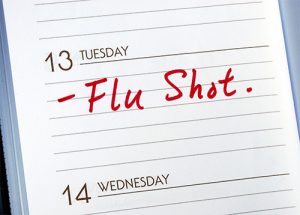- September 21, 2012
- Flu Shots, Health Tips
When fall rolls around, many of us find our thoughts turning to cooler temperatures, fall colors, football, and flu shots. Yes, fall is a good time to remember that flu season is just around the corner.
If you are unsure whether or not your abdominal pain warrants a trip to urgent care, it is always best to err on the side of caution. Visit our team at Gemini Urgent Care today for appropriate diagnosis and treatment.
Seasonal flu is a contagious respiratory illness caused by influenza viruses. According to the Centers for Disease Control, 5 to 20 percent of Americans contract the flu each year, leading to approximately 200,000 hospitalizations. Flu-related deaths vary from year to year but can range from 3,000 to 49,000.

Flu vaccination is the best preventative measure, and the CDC recommends everyone six months of age and older get vaccinated each year. Although flu season peaks during the months of January and February, the CDC also recommends getting a flu shot as soon as it becomes available in your area, which is typically late summer or early fall. Flu vaccination is especially important for individuals with a higher risk of complications:
- Children and infants
- Pregnant women
- Seniors
- People with disabilities
- People with chronic or ongoing health conditions
- Travelers
What if you get the flu?
Common flu symptoms may include a fever, cough, sore throat, headaches, body aches, chills, fatigue, nausea, vomiting, and/or diarrhea. A mild case of the flu may resemble a severe cold, and flu symptoms can last from one to two weeks.
While it’s unpleasant, the flu doesn’t typically pose a threat to healthy individuals. But if you’re a high-risk individual, or symptoms become severe, it may be important for you to seek medical attention.
When do you need medical attention?
If you suspect you’re suffering from the flu, your doctor or health care provider can run tests to confirm an accurate flu diagnosis. In some cases, the doctor may prescribe antiviral medications to lessen the symptoms and prevent complications, or antibiotics if a bacterial infection is present.
You should seek medical attention immediately if you experience any of the following symptoms:
- A fever that lasts longer than three days
- Difficulty breathing, or shortness of breath
- Purple or blue discoloration of the lips
- Pain or pressure in the chest or abdomen
- Sudden dizziness
- Confusion
- Severe or persistent vomiting
- Seizures
- Flu-like symptoms that improve but return with fever and worse cough
Infants and young children should receive medical attention at the onset of flu symptoms, as well as individuals with health conditions like diabetes, heart disease, asthma, COPD, or HIV/AIDS. Always seek medical attention right away if you or a loved one suffers from shortness of breath or a stiff neck, as these can be signs of a more serious condition.
EmergiCare, located in the heart of Clear Lake City, Texas, is equipped to handle any ailment, condition, or injury that would be treated at a hospital emergency room. EmergiCare has the staff and facilities to treat all critical and emergent health conditions, without the long wait times associated with hospitals. If you experience severe flu symptoms that need prompt medical attention, EmergiCare can give you the attention and care you need.
